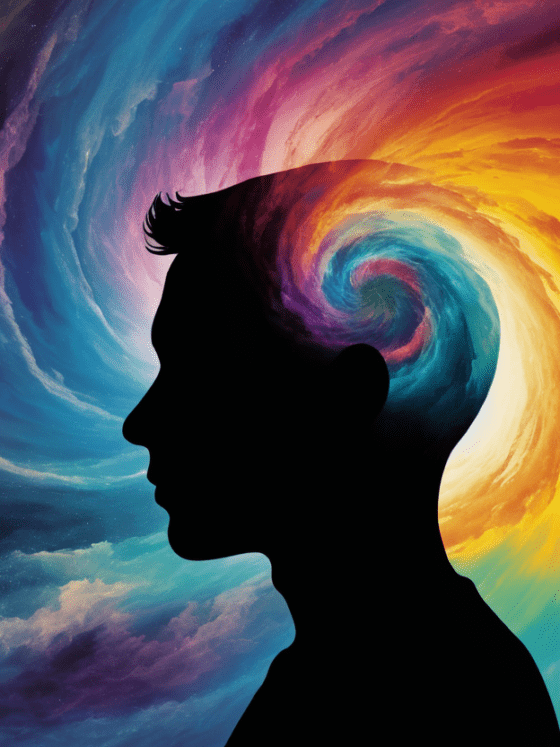Are you feeling that guilt was weighing your shoulders, which makes it difficult to take a step forward? There’s no reason to feel like you’re alone. It’s a normal feeling and it’s a problem that can prevent your growth and making you feel satisfied with your self. The time is now to identify how guilt can be keeping you from progressing and taking measures to get rid of it.
The signs of guilt can manifest through a myriad of means, such as anxiety, depression or obsessive behavior. You may feel as if you’re a burden for others. You don’t need to live with those emotions. If you can recognize guilt and be gentle with yourself, it is possible to get out of the rut. This trip will take you takes you to emotional liberation can be difficult, yet it’s essential. It’s a long process, but you deserve to be free of shame and regret.

If you accept yourself and forgive yourself, you are able to forget about the past while living in the present. Be aware that you’re not the only one in this battle. With the proper help and guidance, you’ll be able to get back in control of your life, and be free from guilt.
Understanding the Nature of Destructive Guilt
Guilt is an emotion that’s complex which affects our mental wellbeing very. A healthy sense of guilt indicates that we are able to live with the moral compass. In contrast, excessive and persistent guilt may harm us by creating anxiety, depression and obsessive thinking.
To let go of the grip of guilt, it is important to understand the various kinds and the effects they have on our lives.
Different Types of Guilt and Their Impact
The feeling of guilt can take many ways, each one affecting people in different ways. The most common cause of guilt is having a sense of guilt over things that are beyond our be in control of. It can cause us to feel unsatisfied and inadequate.
The feeling of shame and guilt that we share occurs whenever we feel resentful over the actions of our community. It can cause us to be reluctant to confront the issue, resulting within a loop of guilt and blame for ourselves.
How Guilt Affects Mental Well-being
The impact of guilt on mental well-being is immense. People often feel guilty for not feeling enough guilt. The unhealthy obsession with guilt can cause mental health issues like anxiety and depression.
The Psychology Behind Chronic Guilt
A lot of chronic guilt begins during early childhood. Sometimes, we hide our true self to please parents or our caregivers. This could lead to a life-long self-pity and feelings of unworthiness.
Knowing why we are feeling shameful is crucial to breaking the chains. When we face the root of our guilt and breaking through these barriers and obstacles, we will begin to appreciate ourselves more. It helps us quit living with shame and progress.
The Hidden Cost of Carrying Emotional Chains
The burden of guilt comes with an enormous hidden price. It may fill your head and alter your mood and thinking. It could seriously harm the mental health of your family and general wellbeing.
Studies show that 40 percent of individuals are embarrassed and feel ashamed following their choices. In excess of sixty percent those fear their choices in fear of the results. The emotional strain may make you feel like someone else’s burden.
- 75% of people are worried over what other people consider and worry about being assessed.
- The majority of people deal with guilt. This consumes a great deal of energy and makes them exhausted.
- It is a factor that affects 30% of individuals and makes them reluctant to try new things due to the fear of making mistakes.
Recognizing these concealed costs is the first stage to getting rid of the burden of guilt and finding your authentic self. After that, you’ll be able to begin making amends for your emotional scars and leading a happy and authentic life.
When we let go of guilt, we free ourselves to be the people we were meant to be. - Brene Brown

Stop Living For Guilt: Recognizing Unhealthy Patterns
Being free of guilt is the key to gaining peace and forgiveness. It is the first step to identify the indicators of having over-reaching guilt. The most obvious sign is if you blame yourself for your past errors or other things that you aren’t able to manage.
Signs of Excessive Guilt
- Continuous self-criticism and self-deflection
- A difficult time letting go of old mistakes and regrets
- You feel guilty about you have your own personal needs and wishes
- Believing that you can please people, but while sacrificing the health of your own.
Breaking the Cycle of Self-Blame
Stop blaming yourself and take a look at the things that cause you feel guilt. Take care of yourself and keep in mind that everyone has mistakes. If you change the way you think, you will begin to let go of anxiety.
Identifying Guilt Triggers
Being aware of what causes you to feel guilty is essential. If you can identify the trigger what triggers you, there are ways to deal with the issue. This will allow you to live an easier and more compassionate life.
In recognizing excessive guilt, putting aside self-blame as well as identifying the triggers that is causing it, you can begin an adventure. This is a journey focused on getting out of the traps of guilt, overcoming shame and self-forgiveness.
Guilt is a destructive emotion that can hold us back from living our best lives. By acknowledging and addressing it, we can free ourselves to embrace self-acceptance and move forward with purpose.
Spiritual Wellness and Guilt Release Practices
Engaging in meditation and spiritual health will help you let go of guilt. It allows you to connect to your soul and allows you to see your guilt, without judgement. Meditation and mindfulness make your present and help break guilt’s hold over your mind and your heart.
Philosophers such as Nietzsche and Heidegger provide insight into guilt. They assist you in understanding guilt’s impact on your personal life. This could lead to more understanding of guilt as well as the impact it has on your life.
- Regularly practice mindfulness to be aware of guilt and not feel attached.
- Examine philosophical views on guilt and the connection between it and authenticity.
- Engage in the energy healing techniques such as Reiki or chakra balance, for restoring your emotional wellbeing.
- Accept the idea of radical acceptance in order to release past regrets and to move on by embracing self-love.
In bringing spiritual wellbeing and guilt relief into your lifestyle and you will find inner peace and bliss. The journey will help you conquer anxiety and live an real living.
The ultimate aim of the spiritual life is not merely to punish or reward, not merely to cultivate virtue, but to facilitate a meeting between our limited and finite selves and the boundless, infinite reality which is the ground of all being. - Huston Smith
The Power of Radical Acceptance in Healing
Acceptance is the most important instrument to help you find happiness and peace following an experience of trauma. It was introduced by Marsha Linehan, in her book Dialectical Therapy (DBT) which means acceptance of the present moment in full. It is not a matter of judgment or resistance.
Embracing Present Moment Awareness
Mindfulness can help you stay focused on your present. It helps you let go of any past guilt that has caused you to feel. Tara Brach, an expert in the field of mindfulness as well as Buddhist psychology, stresses the power of radical acceptance. The practice helps you to see the thoughts and emotions you have and not be entrapped by them. This leads to forgiveness and healing.
Letting Go of Past Regrets
Acceptance that is radical also implies letting go of old regrets. In the words of Carl Rogers said, “The curious paradox is that when I accept myself just as I am, then I can change.” Accepting your past, positive and negative it frees you from shame. This is the first step towards inner peace.
Moving forward with self-compassion
The acceptance of radicality helps you understand the fact that suffering is a normal and part of life. It helps to develop self-compassion. This allows you to approach forgiveness by embracing kindness and compassion. Accepting what you are unable to manage, you can concentrate on moving forward in a positive direction and find peace and joy.
The acceptance of radical change can be a significant step in the direction of emotional liberation and recovery. In letting off the past, embracing today, and moving forward by being kind, you can unlock the inner peace and happiness.
The curious paradox is that when I accept myself just as I am, then I can change. - Carl R. Rogers
Chakra Balancing for Emotional Freedom
The balancing of chakras is an effective method to free yourself from guilt. Chakras are the energetic centers of our bodies. If they’re in balance this can greatly affect our psychological well-being..
The sacral chakra below your navel is the most important to letting go of guilt. It is linked to feelings, creativity and happiness. Sacral chakras that are blocked could lead to feelings of shame, guilt and suppressed emotions.
Yoga, meditation as well as crystal healing are a way to bring balance to your sacral chakra. When you focus on the sacral chakra, you will be able to release emotional weights.
If you can balance the sacral chakra, you might feel more relaxed emotionally. Additionally, you’ll experience the increase in your enthusiasm and happiness. This will help you to achieve self-forgiveness, peace and harmony.
When the sacral chakra is balanced, you feel a sense of fluidity, sensuality, and emotional expression. This can be incredibly liberating and support your emotional freedom. - Energy Healing Expert
Finding emotional peace isn’t easy. It requires patience, self-compassion and experimenting with different techniques for healing. The balancing of the chakras is an effective way to achieve wellbeing and a stress-free lifestyle.
Self-Forgiveness: Your Journey to Inner Peace
Beginning the self-forgiveness process is a major move towards peace within and improvement. Through recognizing your errors and showing kindness to yourself and forgiveness, you will be free from shame and guilt. It allows you to move on with a clearer head.
Writing Your Self-Forgiveness Letter
Self-forgiveness letters can be incredibly heal. Recall times that you failed to meet your own goals. Recognize your mistakes and shortcomings. Make mistakes are an aspect of human nature and developing.
When you write, concentrate in finding peace and then move toward your goals with kindness to you.
Practice of Daily Self-Compassion
- Begin your daily routine with mantras or a meditation, to keep studying your letters.
- Switch your negative thinking to positive ones that encourage your growth and development.
- Be sure to celebrate all your accomplishments regardless of how small or big, in order to cultivate self-love.
Building New Emotional Patterns
The practice of self-forgiveness and kindness each day can help you break the old habits. The process isn’t easy and takes a lot of time however, it’s well worth the effort. Take your time and be confident that you’re becoming more authentic and fulfilled version of you.
Forgiveness is not an occasional act, it is a constant attitude. - Martin Luther King Jr.
Creating Healthy Boundaries for Emotional Well-being
Establishing healthy boundaries is essential to improving your health emotionally and discovering your authentic self. Learning to accept no matter what as well as taking care of yourself and accepting that you aren’t able to satisfy everybody. These actions will allow you to get rid of the guilt that keeps you from progressing.
The boundaries you set protect your energy and help prevent guilt from building into. Be aware that taking care of your self isn’t an act of selfishness. It’s vital to your health as well as helping other people. Good boundaries can help you build stronger connections as well as more authentic relationships.
The process of establishing boundaries can be hard because it involves dealing with feelings such as anxiety and shame. However, by confronting these emotions and receiving assistance, you gain strength and self-confidence. So, you’ll be able to get back in control and be free of guilt.
FAQ
What is the nature of destructive guilt?
Guilt is a feeling of regret and sadness. It’s okay to feel guilty when we’ve done something wrong. But, feeling guilty for too long can harm our mental health.
It can lead to depression and anxiety. This happens when we take too much blame for things we can’t control.
How does guilt affect mental well-being?
Guilt can weigh heavily on our minds. It can affect how we feel and think. This can harm our mental health and overall happiness.
Feeling guilty for too long can make us feel like we’re a burden to others.
What are the signs of excessive guilt?
Excessive guilt shows in constant self-blame and trouble moving past mistakes. It’s when we feel responsible for things we can’t control. Breaking free means challenging our thoughts and being kind to ourselves.
How can spiritual wellness help in releasing guilt?
Spiritual wellness is key in letting go of guilt. Mindfulness and meditation help us observe guilt without judgment. They let us move on.
Philosophy also offers insights into guilt and how it relates to being true to ourselves and our morals.
What is the power of radical acceptance in healing from guilt?
Radical acceptance is a strong tool against guilt. It’s about accepting the now without resistance. This allows us to let go of past regrets.
This mindset helps us move forward with kindness towards ourselves. It shows us that hard times are part of life.
How can chakra balancing contribute to emotional freedom from guilt?
Chakra balancing is a way to heal from guilt. It focuses on balancing the body’s energy centers. This helps release emotional blockages tied to guilt.
What is the importance of self-forgiveness in the journey to inner peace?
Self-forgiveness is vital for inner peace. Writing a letter to yourself can help acknowledge mistakes and show self-compassion. Daily self-compassion builds new emotional patterns free from guilt.
How can creating healthy boundaries help in breaking free from guilt traps?
Healthy boundaries are crucial for emotional health and escaping guilt. It’s about learning to say no and taking care of yourself. Remember, you can’t please everyone.
Setting boundaries helps you find your true self and avoid unnecessary guilt.






